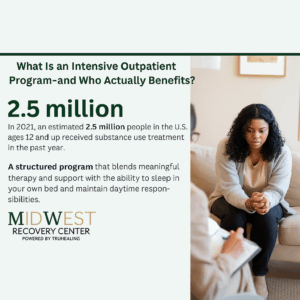If you’ve ever typed “do I need rehab?” into a search bar at 2 a.m., you’re not alone. But maybe the real question isn’t whether you need help—it’s what kind. Not everyone needs to hit pause on their entire life to get support. That’s where an Intensive Outpatient Program (IOP) can meet you in the middle.
At Midwest Recovery Center in Toledo, we know that for some people, the hardest part of getting help isn’t admitting there’s a problem—it’s figuring out what kind of help fits. This guide breaks down what an IOP actually looks like and who tends to benefit most.
What Exactly Is an Intensive Outpatient Program?
An Intensive Outpatient Program is a treatment option for substance use and mental health that blends structure with flexibility. It’s designed for individuals who need meaningful support—but not 24/7 care.
You attend therapy multiple times per week, often for three or more hours per session. Most IOPs include:
- Group therapy: to explore triggers, stressors, and coping strategies with peers
- Individual counseling: to work one-on-one with a therapist or counselor
- Education sessions: to understand addiction, mental health, and recovery tools
- Monitoring and accountability: like drug testing or progress check-ins
But unlike inpatient or residential treatment, you go home at the end of the day. You keep sleeping in your own bed, showing up for work, and handling your responsibilities—while getting consistent care.
Who Is an Intensive Outpatient Program Designed For?
There’s a myth that you have to be at rock bottom before treatment makes sense. But real life is messier than that. Many people who benefit from IOP are still functioning on the outside: working, parenting, socializing. That doesn’t mean they’re okay on the inside.
You might benefit from IOP if:
- You’re exhausted from managing your substance use alone
- You’ve set rules for yourself (“Only on weekends,” “Not before 5”)—and broken them
- You’ve tried to stop, cut back, or moderate—and it doesn’t stick
- You want help, but inpatient treatment feels like too much right now
- You’ve just completed detox or inpatient care and need ongoing support
IOP is also a good step for those in early recovery who need a “bridge” back to everyday life. It offers structure without removing you from your community.
What Happens in a Typical IOP Week?
At Midwest Recovery Center, we tailor every IOP plan to the individual—but here’s what a general week might include:
- Three to five group sessions: Group therapy provides support, community, and new tools.
- One-on-one counseling: Personalized guidance to explore trauma, triggers, or goals.
- Psychoeducation: Learn how addiction works, what relapse prevention looks like, and how to rebuild life in recovery.
- Relapse prevention planning: Build strategies to manage cravings, stress, and high-risk situations.
- Life skills development: Sessions might include communication skills, emotional regulation, or boundary setting.
Most clients spend 9–15 hours a week in sessions, often in the evening to allow for work or school during the day.
The Hidden Cost of “Holding It Together”
It’s easy to downplay your own struggles when everything looks fine from the outside. But just because you’re functioning doesn’t mean you’re okay. Many high-functioning people in active addiction are:
- Living double lives
- Managing guilt, anxiety, or shame behind closed doors
- Feeling numb, detached, or exhausted
- Using substances to maintain the performance, not to enjoy it
If that sounds familiar, IOP can offer a place to pause the performance and reconnect with what’s underneath.
IOP vs. Other Levels of Care
Choosing the right level of care isn’t about checking a box. It’s about finding a program that fits your reality. Here’s how IOP compares to other options:
| Level of Care | Living Situation | Hours/Week | Best For |
|---|---|---|---|
| Detox | Inpatient | 24/7 | Managing withdrawal safely |
| Residential Treatment | Inpatient | 24/7 | Severe substance use or mental health |
| Intensive Outpatient | At home | 9–15 hrs/week | Moderate needs, high-functioning clients |
| Standard Outpatient | At home | 1–3 hrs/week | Maintenance or post-IOP support |
If you’re not sure which fits, that’s okay. We help people sort that out every day.
Is It Time to Consider an IOP?
You don’t need a dramatic rock bottom moment to explore treatment. In fact, most people benefit from seeking help earlier. Here are some signs IOP could be a good fit:
- You’ve started hiding your use—or the consequences of it
- You’re “fine,” but getting through the day takes more than it should
- You worry what would happen if someone found out how much you’re using
- You’ve been searching online about treatment, wondering if it’s time
- You feel like you’re living two lives—and you’re tired
IOP isn’t a punishment or a judgment. It’s a place to get clear, supported, and honest about what you want life to look like.
FAQ: Intensive Outpatient Program Basics
Is IOP only for addiction?
No. While many people enter IOP for substance use concerns, it can also support mental health conditions like anxiety, depression, trauma, or bipolar disorder.
Can I still work or go to school while in IOP?
Yes. That’s one of the main advantages. Our IOP schedule in Toledo offers flexible times—including evening options—to make participation realistic.
What if I’ve been to treatment before?
You’re not starting over—you’re continuing the work. IOP can help you build on what you learned and strengthen your recovery.
Do I have to “admit” I’m an addict to start IOP?
No. Labels aren’t required. If you’re struggling and want support, that’s enough.
How do I get started?
Call us. We’ll talk through what’s going on and help you figure out whether IOP—or another level of care—is right for you.
📞 Ready to Talk Through Your Options?
At Midwest Recovery Center, we offer flexible, confidential intensive outpatient programs right here in Toledo, Ohio. If you’re curious about what support could look like for you, call us at (833) 657-0858. We’ll help you sort through your options—without pressure, shame, or assumptions.









